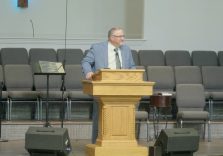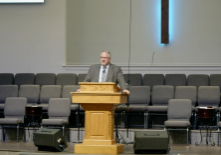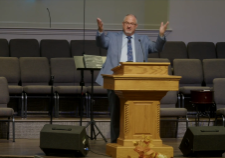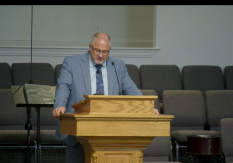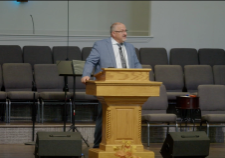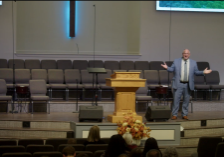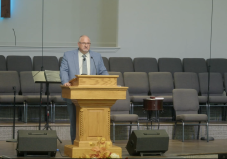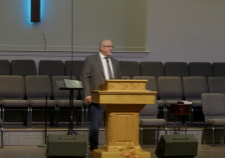The central theme of this podcast episode revolves around the concept of Christians being “laborers together with God,” emphasizing the importance of active participation in the Great Commission. The speaker articulates that every church member has a role in ministry and that the motivation to serve should stem from a genuine love for Christ rather than mere obligation. They stress that serving and witnessing are not only responsibilities but also privileges that stem from an intimate relationship with God. As the episode unfolds, the speaker reinforces that spiritual growth and fulfillment come from actively engaging in God’s work, which includes evangelizing and nurturing new believers. Ultimately, the message encourages listeners to reflect on their personal commitment to sharing the Gospel and to recognize that they are never alone in this endeavor, as God is always present, working alongside them.
Takeaways:
- The podcast emphasizes the importance of understanding the Great Commission as a foundational task for every Christian, highlighting that each believer is called to share the Gospel actively.
- Speaker A stresses that serving God should stem from a genuine love for Him rather than mere obligation, suggesting that true motivation comes from a relationship with Christ.
- Listeners are reminded that every church member is considered a minister, and it is crucial for Christians to recognize their role as witnesses in the community.
- The discussion includes the concept of being ‘laborers together with God’, indicating that the work of spreading the Gospel is a collaborative effort between believers and God Himself.
- The podcast encourages individuals to develop a personal game plan for evangelism, suggesting that relationships should be nurtured with the intent to share the Gospel effectively.
- Finally, the speaker reflects on the need for unity within the church, as division can hinder the pursuit of the Great Commission and the overall mission of sharing the faith.
Transcript
It's a long time ago.
Speaker A:And that theme is Laborers together with God.
Speaker A:Tonight, I just want to.
Speaker A:The emphasis is the Great Commission.
Speaker A:The emphasis is the work of God.
Speaker A:The emphasis is when Jesus said, I came to do the work of my Father, what was the work?
Speaker A:What is the work?
Speaker A:And I know I'm preaching to the choir tonight, and we do have some new families, so I want to be clear.
Speaker A:And in some ways, tonight will be very elementary and it's approach and application.
Speaker A:But it's also a reminder for those of us who've been around a while that God intends for every church member to be a minister, but God intends for every Christian to be a witness.
Speaker A:Every Christian owes it.
Speaker A:Every Christian ought to feel an obligation.
Speaker A:But that motivation only gets you so far.
Speaker A:If you're teaching a class because you feel obligated or you are participating in whatever ministry it is because you feel obligated or you feel it's the right thing to do.
Speaker A:And it is.
Speaker A:But I want to remind you tonight that motivation is important.
Speaker A:If you're walking daily with the Lord and you're spending time with him and you're loving him more and more, serving him will not be an obligation.
Speaker A:It just won't.
Speaker A:Now, again, I always clarify when I preach a message like this from time to time.
Speaker A:There's going to be a Sunday morning, you wake up and you just, yeah, it hadn't gone well.
Speaker A:I'm not talking about.
Speaker A:That would be the exception to the rule.
Speaker A:But the majority of the time, we ought to serve the Lord because we want to.
Speaker A:Our motivation should be that the love of Christ constraineth us and what he did on Calvary.
Speaker A:And just as we preached this morning, we need to go back to Calvary, go back and focus on what Jesus did for us.
Speaker A:And that would include not only when it comes to living our life for Jesus, but serving him.
Speaker A:If we're not careful, we find ourselves in the habit of just going through the motions.
Speaker A:We've taught this or we've done this for years, and we find ourselves in a circular pattern and we need to be reminded.
Speaker A:And our missionaries come through and they do it, and they remind us of the Great Commission a lot.
Speaker A:And.
Speaker A:But I think it's important as we approach Friend Day, that each of us take to heart what the work of God is.
Speaker A:The work of God is what is that work?
Speaker A:So look with me in 1 Corinthians 3, and we'll start in verse 1 and read through verse 9 or 10.
Speaker A:Here we go.
Speaker A:And I, brethren, could not speak unto you as unto spiritual, but as unto carnal, even as unto babes in Christ.
Speaker A:So we'll do a little running commentary.
Speaker A:Everybody knows this is Paul.
Speaker A:He is writing a letter to the church at Corinth.
Speaker A:This is the Book of Corrections.
Speaker A:He's correcting this church.
Speaker A:This church had been very selfish, very carnal.
Speaker A:And so he's addressing problems in the church and here in particular, he's saying to them, I can't even talk to you like adults.
Speaker A:I've got to come down to a level of a child spiritually and talk to you.
Speaker A:I have fed you with milk, verse two.
Speaker A:And not with meat.
Speaker A:In other words, you couldn't take the meat.
Speaker A:For hitherto ye were not able to bear it neither yet now are ye able, for ye are yet carnal.
Speaker A:For whereas there is among you envying and strife and division, are ye not carnal and walk as men?
Speaker A:For while one saith, I am of Paul, and another, I am of Apollos, are ye yet carnal?
Speaker A:Are you not carnal?
Speaker A:Verse 5. Who then is Paul?
Speaker A:And who is Apollos, but ministers by whom ye believed?
Speaker A:Even as the Lord gave to every man.
Speaker A:In other words, the message Paul and Apollos preached, he gave to every man.
Speaker A:They just be.
Speaker A:They were just the ones who gave the message.
Speaker A:In other words, he's going to describe it for us and tell us what it means.
Speaker A:But Paul's again saying, I'm nothing.
Speaker A:Apollos is nothing.
Speaker A:Verse 6.
Speaker A:Again, even as the Lord gave to every man.
Speaker A:Verse 6.
Speaker A:I have planted, Apollos watered, but God gave the increase.
Speaker A:So then neither is he that planteth anything, neither he that watereth, but God that giveth the increase.
Speaker A:Now, he that planteth and he that watereth are one.
Speaker A:You got to have both to have growth.
Speaker A:And every man shall receive his own reward according to his own labor.
Speaker A:Verse nine.
Speaker A:Our text tonight.
Speaker A:For we are laborers together with God.
Speaker A:Ye are God's husbandry.
Speaker A:Ye are God's building.
Speaker A:And the illustration from this first part is that of an agricultural illustration.
Speaker A:And then it switches to a building illustration.
Speaker A:So we're going to deal with just with the agricultural illustration here by Paul.
Speaker A:Heavenly Father, we thank you for the opportunity we do have to serve you and labor together with you.
Speaker A:Lord, what a blessing it is to serve in this wonderful church along with our church family.
Speaker A:And I pray God that you would bless the efforts this week as we prepare for Friend Day.
Speaker A:May each of us do our part in reaching others around us with the Gospel of Jesus Christ.
Speaker A:May our hearts be burdened for those around us.
Speaker A:We thank you again.
Speaker A:We love you and Jesus.
Speaker A:Jesus name.
Speaker A:Amen.
Speaker A:So we again see, primarily we'll deal with verses six.
Speaker A:Forward.
Speaker A:I have planted.
Speaker A:Apollos is watered, but God gives the increase.
Speaker A:God uses people.
Speaker A:He even says that there at the end of verse five, even as the Lord gave to every man.
Speaker A:This wasn't just the message given to Paul and Apollos.
Speaker A:They're the ones who presented the gospel, the work.
Speaker A:But he has given that to every man.
Speaker A:All of us have that responsibility of giving the gospel, all of us as Christians.
Speaker A:God uses people.
Speaker A:He uses human instruments to do the work.
Speaker A:By the way, the one I was going to quote this morning.
Speaker A:We believe in the primacy of preaching at church.
Speaker A:First Corinthians 1:21.
Speaker A:It pleased God by the foolishness of preaching to save them that believe.
Speaker A:I want you.
Speaker A:You know one of these verses, so don't turn there.
Speaker A:Matthew 28.
Speaker A:All of us, for the most part, have it memorized or at least know the verse.
Speaker A:And again, we are to go into all the world.
Speaker A:I'm actually going to go over there and read it so that I point something out to you.
Speaker A:And we've heard it said many, many times.
Speaker A:It's good to be reminded.
Speaker A:And Jesus came and spake unto them, saying, all power is given unto me in heaven and earth.
Speaker A:Go ye therefore, and teach all nations, baptizing them in the Father of the Son and the Hol Ghost, teaching them to observe all things whatsoever I've commanded you.
Speaker A:And lo, I am with you alway even unto the end of the world.
Speaker A:We know this is the Great Commission.
Speaker A:This is the commission that God gave the church before he ascended into heaven, that we are to give the gospel.
Speaker A:We are to evangelize, we are to baptize converts, baptize.
Speaker A:And then we are to stabilize.
Speaker A:We are to teach and disciple those converts.
Speaker A:It's up to us to do that.
Speaker A:So the Great Commission is a threefold commission.
Speaker A:It's to win them, wet them and work them.
Speaker A:Okay?
Speaker A:And I'll move on.
Speaker A:Evangelize, baptize, stabilize, however you want to say it, that is a threefold commission.
Speaker A:It's important that we do all three.
Speaker A:The commission is not just give the gospel.
Speaker A:The commission is give the gospel.
Speaker A:And if they get saved by the way, it's the Lord who does that.
Speaker A:He gives the increase.
Speaker A:And then we are to do have just as much effort of following up them and making sure they get baptized as we did giving them the gospel.
Speaker A:Because if we don't do that, we haven't fulfilled the Great Commission.
Speaker A:And then we should give as much effort as to seeing to make sure they get discipled, whether they get into the church discipleship program, they're coming to Sunday school, coming to church and being discipled.
Speaker A:It's important that all three of the Great Commission be done threefold Commission.
Speaker A:I want to point out something, and we do generally point this out in the Great Commission when it says, when you do these three things, Jesus.
Speaker A:Because those were Jesus words that I just read.
Speaker A:Jesus said, and lo, I am with you always.
Speaker A:Even unto the end of the world, I am with you.
Speaker A:Another verse that we use a lot in dealing with the Great Commission because it is mark, chapter 16, mark 16.
Speaker A:I'm going to turn there and read it.
Speaker A:Most of you can quote this, too.
Speaker A:Mark 16, verse 15.
Speaker A:And he said unto them, all right, this is Jesus words once again, go ye into all the world and preach the gospel to every.
Speaker A:What creature?
Speaker A:Most of us know the verse as he continues to say, he says, and he that believeth and is baptized shall be saved.
Speaker A:But he that believeth not shall be damned.
Speaker A:By the way that does away with baptism, saving you says, yeah, he shall be saved.
Speaker A:But those who do not believe will go to hell.
Speaker A:And these signs shall follow them that believe in my name shall they cast out devils.
Speaker A:They shall speak with new tongues, and they shall take up serpents.
Speaker A:And if they drink any deadly thing, it shall not hurt them.
Speaker A:And they shall lay hands on the sick and they shall recover.
Speaker A:So these sign gifts are going to follow them as they preach the gospel and send the gospel.
Speaker A:We know that those sign gifts were a part of the infant church.
Speaker A:They're a way in which God was able to not only speak to his church, but also a way in which he was to authenticate the church.
Speaker A:In other words, these powers, these sign gifts, followed them for God to be able to, you know, to say that, hey, God is in this.
Speaker A:Everybody see that?
Speaker A:So we're not taking up snakes today.
Speaker A:That was the early church.
Speaker A:Those sign gifts have been done away with.
Speaker A:The Bible says in First Corinthians 15, they're no longer needed.
Speaker A:The sign gifts of tongues and prophecy, those have all been done away with.
Speaker A:But in the early church, they were there.
Speaker A:But I didn't Finish reading verse 19 and 20, he says this.
Speaker A:And so then, after the Lord had spoken unto them, he was received up into heaven and sat on the right hand of God.
Speaker A:So after he had spoken, he had given the Great Commission to The church, he ascends into heaven.
Speaker A:We see this in Acts, chapter one.
Speaker A:He ascends into heaven, sat at the right hand of God.
Speaker A:And I'm going to read the last verse of the chapter.
Speaker A:And they went forth talking about the disciples.
Speaker A:They went forth and preached everywhere.
Speaker A:The Lord listen to this.
Speaker A:The Lord working with them and confirming the word with the signs following them.
Speaker A:So the sign gifts were confirming the word of God and confirming the church.
Speaker A:That God was going to use the church and he was using these disciples.
Speaker A:But notice what it said.
Speaker A:What did it say?
Speaker A:The Lord working with them.
Speaker A:I don't know.
Speaker A:I just, I read that verse, those verses a thousand times and that just kind of popped out to me.
Speaker A:Where was Jesus when he.
Speaker A:When he said all these things?
Speaker A:Where was Jesus at?
Speaker A:It says he was ascended into heaven.
Speaker A:Verse 19 says, he ascended into heaven.
Speaker A:But then verse 20 says, as they went to preach and as they went to teach and as they spread the gospel, the Lord working with them, the Lord working with him, what did Matthew say?
Speaker A:Matthew said, and Jesus said, there, lo, I am with you when you go, when you give the gospel, when you tell your neighbor, when you tell your co worker, when you tell your aunt or your family member and you're talking to them about the Lord or about church, it makes it very clear, very, very, very, very clear that you are not alone.
Speaker A:You're not alone when you're discussing religion at the job, you're not alone when you're discussing religion with your family, you alone.
Speaker A:If your purpose, and it ought to be the purpose of discussing religion at work or discussing, by the way, when you're at work, discuss religion in the appropriate time frame, not on the clock, right?
Speaker A:Unless your boss allows that.
Speaker A:But if you're discussing religion and you're discussing with your aunt, family, whatever, and your motivation for doing so is not just for argument's sake, whatever, but your motivation is to give them the gospel.
Speaker A:That's what it ought to be.
Speaker A:I'm developing this relationship with my neighbor.
Speaker A:I'm developing relationship with a co worker, I'm developing relationship with whomever it may be, a family member, even in order that I might give them the gospel, period.
Speaker A:I want them to receive Jesus Christ as their savior.
Speaker A:And what the Bible's saying is that you're not alone when you're doing that.
Speaker A:So many people are afraid to talk about Jesus to others.
Speaker A:Not because they're afraid of even maybe what others may say.
Speaker A:Sometimes that's the case, but more often than not, they're just nervous.
Speaker A:I don't know what to say or I'm afraid I'll say something wrong or listen, you're not alone.
Speaker A:When you're talking to someone about Jesus Christ, he's with you.
Speaker A:It says the Lord working with them.
Speaker A:And I love our text, love it.
Speaker A:Co laborers with God.
Speaker A:I know most of you know that as a kid, and even up until a few years ago, our family had a farm in Oklahoma.
Speaker A:And I had lots of opportunities to go and work on the farm.
Speaker A:When I was a kid, my dad and mom would meet my papa and grandma in Terrell, Texas or somewhere, and they'd swap, you know, mom and dad drop the kids off with papa and grandma and they would run, you know, I said, wonder why the car peeled out when they were leaving.
Speaker A:Papa and grandma are going to keep us for a week or two.
Speaker A:One time when I broke my arm.
Speaker A:I've told you this story a hundred times, too, some of you.
Speaker A:I stayed up there for three or four weeks.
Speaker A:I'd stayed up there the entire time that my arm was broke.
Speaker A:I couldn't do nothing else anyway.
Speaker A:Might as well work there real quick for funny.
Speaker A:I did everything in the world on the farm while my arm was broke.
Speaker A:I had that back then, it was just a white cast.
Speaker A:And by the end of that three weeks, that cast was so soft and just a mess.
Speaker A:Just because I'd been driving the tractor, I'd been doing just about.
Speaker A:I went swimming in it, in the pond, in the tank.
Speaker A:Yeah.
Speaker A:And it was just so.
Speaker A:My pawpaw took white shoe polish, you know, did our best effort.
Speaker A:What a great time we had.
Speaker A:But laboring together.
Speaker A:We think about laboring together again.
Speaker A:The analogy here is agricultural.
Speaker A:Many times, whether it was planting or plowing.
Speaker A:One day, one time my grandmother planted a bunch of potatoes.
Speaker A:And I don't know, it was a lot of potatoes, maybe a half acre of potatoes.
Speaker A:And we helped plant them and then we helped, you know, take care of them.
Speaker A:And wasn't a lot to take care of, but I remember taking that single plow with the handles.
Speaker A:Of course, you didn't pull it with a horse anymore, but pulled it with a tractor.
Speaker A:And you put that plow on the ground, a single plow, you know, and it just lay those potatoes over as you went, went down the roll.
Speaker A:Then you had to pick them, you know, take them off the plant and.
Speaker A:Well, they sure were good, though.
Speaker A:All that work definitely paid off.
Speaker A:Many of you could, you know, understand planting okra.
Speaker A:Okra is amazing.
Speaker A:Some of you from the north don't even understand how Good okra is.
Speaker A:Some of you got to the south and went, I don't.
Speaker A:This is yucky.
Speaker A:It's so good.
Speaker A:Okra is good.
Speaker A:Fried okra is so good.
Speaker A:Boiled, slimy.
Speaker A:It's boiled good enough.
Speaker A:You can just eat the stem and all.
Speaker A:Just stick it down.
Speaker A:It just kind of slides down your throat.
Speaker A:Amazing, amazing stuff.
Speaker A:But we even as a kid growing up at the house, my dad generally would plant a garden.
Speaker A:But at my grandparents, there was always a big garden.
Speaker A:And laboring together was a lot of work to put in.
Speaker A:At my grandparents, when they would raise, you know, hay grazer or whatever to feed the cows so that you could have hay in the winter, a lot of work went into that.
Speaker A:It meant you had to not only plant and, you know, disk plow, do all those things and plant, but also mean you had to many times in the summer, lay irrigation pipe and just lots of work.
Speaker A:But I'm so thankful when we labored in those areas, we were always laboring together.
Speaker A:I enjoyed laboring with my pawpaw.
Speaker A:I have such fond memories of laboring with him, working with him, learning from him.
Speaker A:Just wonderful, wonderful things of I enjoyed getting, hearing my brother get yelled at a lot.
Speaker A:I was the one, I was the favorite.
Speaker A:So man, laboring together.
Speaker A:I wasn't alone.
Speaker A:I'm thankful for my pawpaw, who knew way more than I did about any of that stuff.
Speaker A:And whether it was plowing or disking or fertilizing or watering, working on a hay baler or swather or whatever equipment he was working on.
Speaker A:But I sure enjoyed laboring with him.
Speaker A:Why did I enjoy laboring with him?
Speaker A:Because of the relationship I had with him.
Speaker A:He was my pawpaw, a good godly Christian man who had a lot of wisdom, a lot of just good common sense and was mechanically inclined, which I enjoyed too.
Speaker A:Not my brother so much.
Speaker A:My pawpaw knew again, way more than I did.
Speaker A:I'm glad I was laboring with somebody who could teach me.
Speaker A:I was glad I was laboring with somebody who could help me, who could direct me and from time to time encouraged me.
Speaker A:Though most time the encouragement was negative reinforcement.
Speaker A:But I will say that at the end of the day, we knew grandma was going to have something good in supper.
Speaker A:Many times if it was hot summer, man, we just head towards the pond and jump in and just some great times.
Speaker A:But I was never alone working in the field.
Speaker A:Whatever we were doing, we were laboring together, working together.
Speaker A:Imagine now.
Speaker A:And it's hard for us to even conceive this that God is working with us.
Speaker A:When you are witnessing to that individual or you're talking to that individual and you have a long, you know, a long game plan, God is with you there.
Speaker A:He's laboring together with us, the Lord working with us.
Speaker A:Lo, I am with you alway.
Speaker A:What a blessing it is to know that we're laboring with him.
Speaker A:By the way, laboring develops our spiritual muscles.
Speaker A:You ever thought about it this way?
Speaker A:Laboring together develops our spiritual muscles.
Speaker A:When I labored on the farm and working there, it was usually sometimes labor intensive and, you know, helped build muscle, helps keep the keep moving and working helps keep your health, right?
Speaker A:And I'm just telling you, serving the Lord, serving the Lord develops spiritual muscles.
Speaker A:Serving the Lord, working for the Lord, doing the work of the Lord.
Speaker A:But the benefits, as it was on the farm too, are amazing.
Speaker A:We receive the fruit of our reward.
Speaker A:The fruit of planting the potatoes and working the field and then plowing the potatoes up was, I got to eat the potatoes and those were new potatoes and they were so good.
Speaker A:Some of you have experienced this.
Speaker A:You've labored, you've worked an opportunity to see someone you have worked on accept Christ as their Savior.
Speaker A:Amen.
Speaker A:How did that make you feel?
Speaker A:How was the fruit of that?
Speaker A:Some of you teachers who have had the opportunity to see teach for many years and to see your students come to the saving knowledge of Jesus Christ, how was that fruit?
Speaker A:Amen.
Speaker A:See, sometimes we forget the end result.
Speaker A:We get so bogged down in the weeds, we forget to look up and remember that we're laboring together with God.
Speaker A:We're working with him to see the gospel be given to those whom we're laboring for.
Speaker A:Laborers together with God.
Speaker A:Look back at the passage again.
Speaker A:It says, for we are laborers together with God.
Speaker A:We are God's husbandry.
Speaker A:Again, we're laboring what together?
Speaker A:Now this is again together with God.
Speaker A:But we are unified together as a church, working together as a church to fulfill the Great Commission.
Speaker A:And I know I'm a broken record, but I think it's important.
Speaker A:Anytime we preach on this subject is to remind you that we have to be careful because the devil doesn't want our church to spread the gospel.
Speaker A:So what is he going to do?
Speaker A:Well, he's going to try to stop it.
Speaker A:And one of his greatest tools is to get the church divided.
Speaker A:One of his greatest tools is to allow schisms to get going in the church and people, you know, being ugly with each other and selfish with each other.
Speaker A:And some of the things I mentioned this morning that you ought to have your foot on their neck.
Speaker A:You know, pride and so many other things.
Speaker A:But we got to stay unified.
Speaker A:We got to stay unified.
Speaker A:We are the army of the Lord.
Speaker A:We are to be unified in the work.
Speaker A:We're working together.
Speaker A:We're striving together for the Lord.
Speaker A:We're laboring together for the Lord.
Speaker A:One purpose, to share the gospel.
Speaker A:I enjoyed going up to the National Night Out Tuesday night just for a few minutes and shaking hands and holding babies.
Speaker A:That's what pastors do, like politicians.
Speaker A:I'm so appreciative of our church family and the work they put on Tuesday night.
Speaker A:Lots of adults up there and kids working and, you know, passing out literature and sharing the gospel.
Speaker A:That's what it's about.
Speaker A:That's what it's about.
Speaker A:That ought to unify us as a church.
Speaker A:Ought to keep us unified and that we don't get distracted with all the peripheral things because it's easy to do that, too.
Speaker A:Labors together with God.
Speaker A:Again with God.
Speaker A:That ought to humble us.
Speaker A:That's a humbling thought.
Speaker A:We are God's husbandry.
Speaker A:We are a field under God's cultivation.
Speaker A:I'm thankful God is still working on me.
Speaker A:Amen.
Speaker A:I know he's working on you.
Speaker A:A field under God's care.
Speaker A:I'm thankful for the care and love of God.
Speaker A:Aren't you?
Speaker A:That he's working in me in order that he might work through me.
Speaker A:But this would go even further than that.
Speaker A:We are his husbandry.
Speaker A:We're.
Speaker A:He is taking care of us.
Speaker A:So many tonight need the tender touch of God.
Speaker A:So many tonight who need the love of the Lord.
Speaker A:Now I'm talking to Christians as well, who need to experience again that love, that genuine love, that true love, that amazing love that only God can give.
Speaker A:And he is just working on us.
Speaker A:Sometimes he has to prune us.
Speaker A:Sometimes it is God who.
Speaker A:Whom the Lord loveth.
Speaker A:He chasteneth.
Speaker A:Right?
Speaker A:I worked in a peach orchard when I was a kid and they would keep me on in the winter.
Speaker A:I did this for a few years, keep me on the winter and let me prune peach trees.
Speaker A:That's an amazing thing.
Speaker A:I don't know how many peach trees they were.
Speaker A:I don't know if my dad would remember.
Speaker A:There's a bunch of peach trees, maybe 200.
Speaker A:I don't know, a lot.
Speaker A:And what would you do when you prune a peach tree?
Speaker A:When you prune a peach tree, you cut the dead branches off first, right?
Speaker A:Then you got to cut those sucker Branches off.
Speaker A:Usually they.
Speaker A:Peach trees usually grow in the middle or.
Speaker A:And in the winter, they'd even be a different color.
Speaker A:Sometimes you could really tell they were kind of an orangish color.
Speaker A:And you cut those things off.
Speaker A:And then as you got closer to spring, you would create a bowl out of that peach tree as much as possible, with kind of the center open so the sun could shine down in the center of that tree.
Speaker A:It's an amazing thing.
Speaker A:And you want to.
Speaker A:Every once in a while, as it budded, you'd actually shake a few of the buds off.
Speaker A:And if, If.
Speaker A:If you didn't already have that happen by the wind and some other things.
Speaker A:That happens a lot in Texas.
Speaker A:But you pruned it, and it was necessary.
Speaker A:It produced a lot more if you pruned it, if you took care of it.
Speaker A:And we would, you know, so many things we would do to those peach trees.
Speaker A:And God's working on us, shaping us, conforming us to the image of his son, but also just working in our lives because he cares for us.
Speaker A:We are his husbandry again.
Speaker A:Sometimes it takes a little pruning to get us where we ought to be.
Speaker A:Lastly, a harvest is only possible.
Speaker A:This is going to be profound.
Speaker A:Y' all ready?
Speaker A:A harvest is only possible after you plant in water.
Speaker A:I'm going to close my Bible.
Speaker A:We're done.
Speaker A:Profound.
Speaker A:I know that blew you away, but that's really.
Speaker A:Is it.
Speaker A:We want a harvest.
Speaker A:We want to see more people saved.
Speaker A:We want to see more people receive Jesus as their Savior.
Speaker A:We want to see more fruit.
Speaker A:But in order to see the fruit, in order to do the harvest, there's got to be more planting and more watering.
Speaker A:We all like the end result.
Speaker A:We all liked the okra after it was done, or the squash after it's done, or the cucumbers.
Speaker A:By the way, I love growing cucumbers in a garden because most of the cucumbers you buy at the store don't have a taste.
Speaker A:It's like, why am I eating this?
Speaker A:And then you eat one out of a garden, a fresh one.
Speaker A:Yeah, that's what a cucumber is supposed to taste like.
Speaker A:We all like the end result.
Speaker A:When I was working again in that peach orchard all.
Speaker A:Most of the winter, and I also helped with cows and horses and painted and lots of other stuff.
Speaker A:But after I'd done all that pruning, and then I would get up early in the morning when those things started producing, and I would.
Speaker A:I mean, talking about before the sun got up, we'd get out there And I have my basket, my strap wrapped around with my basket in front of me and start picking those.
Speaker A:The first, we had two different kinds of peaches.
Speaker A:The ranger peaches would produce first and then the golden globes, I think that's what they were called, globes of something.
Speaker A:They would produce about two weeks later.
Speaker A:And so they would have peaches to pick for about four to six weeks.
Speaker A:But those ranger peaches, oh, my goodness, you can't buy a good peach at a store because they have to pick them.
Speaker A:And we did, too.
Speaker A:We had to pick them, you know, when they were still hard.
Speaker A:And then you put them because you had to ship them and all those things.
Speaker A:But, man, they called them coals.
Speaker A:We take the culls and I'm telling.
Speaker A:I'm not exaggerating at all.
Speaker A:There would be some peaches on those ranger peach trees almost as big as a cantaloupe.
Speaker A:And I'd pick that thing, fuzz and.
Speaker A:And I would eat as I'm picking, and I would eat two or three peaches every morning.
Speaker A:I love the end result.
Speaker A:But in order to have the end result, there's got to be the planting, there's got to be the watering, there's got to be the work.
Speaker A:And that's the work of the church.
Speaker A:That's the work of us as Christians.
Speaker A:That's the work we're to put in.
Speaker A:And we have to continue in that work.
Speaker A:We have to occupy, as I said this morning, occupy till he comes.
Speaker A:We must continue in the work.
Speaker A:Sometimes we do get, you know, we can get tired in the way, but we should never get tired of the way.
Speaker A:And I think, again, that has a lot to do and everything to do with your walk with the Lord.
Speaker A:If your walk with the Lord is right, you're fellowshipping with Him.
Speaker A:Unless you just need a physical break, which that does happen sometimes.
Speaker A:Then there ought to be a drive within you.
Speaker A:There ought to be a motivation within you because of the love of Jesus and what he did, for you to share that with others.
Speaker A:I'm asking the question tonight.
Speaker A:Are you motivated by the love of Jesus to share him with others?
Speaker A:When's the last time you did that?
Speaker A:When's the last time you told somebody about Jesus?
Speaker A:When's the last time you handed somebody a tract or.
Speaker A:I mean, our missionaries come through here and they talk about it, but when's the last time you did that personally?
Speaker A:Who do you have in mind that you have a game plan?
Speaker A:I don't mean the way that sounds, but you have a game plan.
Speaker A:You have a long range goal of developing a relationship in order that you might give them the gospel, you might see them come to the saving knowledge of Jesus Christ.
Speaker A:There ought to be some people in your brain right now that you just in your heart right now that should come to mind.
Speaker A:Every Christian ought to be telling others about Jesus.
Speaker A:God was so good to you in saving you.
Speaker A:Jesus gave his life for you.
Speaker A:It ought to motivate us to tell others.
Speaker A:Doesn't matter what the preacher says, doesn't matter what the Sunday school teacher says.
Speaker A:Are you motivated to tell others?
Speaker A:Friend day is coming up.
Speaker A:Who have you invited?
Speaker A:It's just an excuse to invite somebody.
Speaker A:You say, well that sounds bad.
Speaker A:It really is.
Speaker A:Hey, we're going to have chicken and we're going to have some barbecue and we're going to have some soup and we're going to have some pie and we're going to have a good fellowship after church and we want you.
Speaker A:We'll have some kids games after church and would you come to church with me Sunday?
Speaker A:He said, well that just sounds.
Speaker A:No, no, no opportunity for them to be under the preaching of the gospel and may we each strive to do that.
Speaker A:Amen.
Speaker A:Let's all stand.
Speaker A:I have a verse invitation tonight.
Speaker A:Jesus paid it all.
Notice a problem?
Our sermon archive represents hundreds of hours of cataloging and dedication by staff and volunteers, but we do not always get things right. Report wrong preachers, titles, or mismatched videos here.

